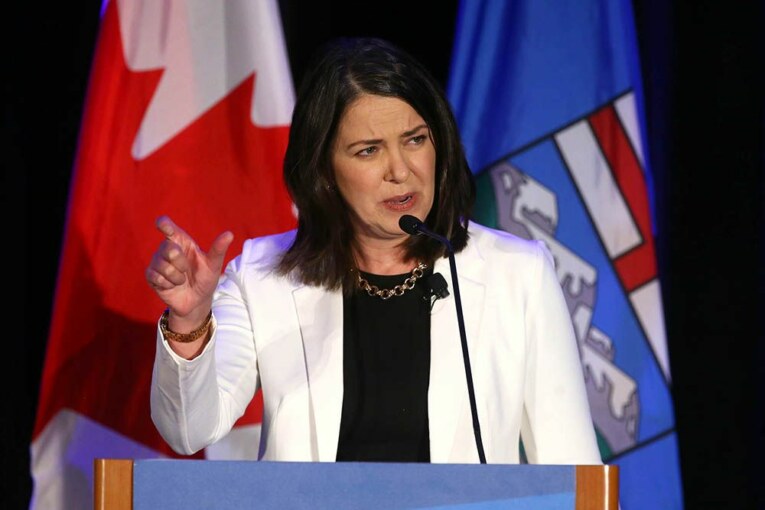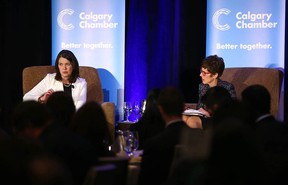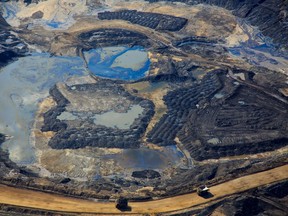
Premier Danielle Smith says she is prepared to use the Alberta sovereignty act to fight Ottawa over its attempt to cap emissions in the Canadian oil and gas sector — or require farmers to cut emissions when they use nitrogen-based fertilizers.
And while she will look to implement more spending to help Albertans who are facing soaring bills, Smith suggested she’s not about to open the spending taps in next year’s budget, even as the province expects to record a mammoth $13.2-billion surplus this year.
In her first speech to the Calgary Chamber of Commerce on Friday, the new UCP leader tried to stake out ground as a fiscal conservative who is prepared to invest in new infrastructure, while also demonstrating she’s willing to fight with the federal government.
The promised legislation that dominated the UCP leadership race this summer — to be called the Alberta Sovereignty Within a United Canada Act — could be quickly used on two fronts: Ottawa’s attempts to curb emissions from the energy and agriculture sectors.
“They cannot take unilateral action to phase out our industry. We have exclusive jurisdiction,” Smith told a crowd of several hundred business leaders.
“This will be the first use of the Alberta Sovereignty Within a United Canada Act. One (case) will be, no we are not going to reduce fertilizer use arbitrarily by 30 per cent . . . And, no, we are not going to allow you to put an arbitrary restriction on our oil and natural gas industry that will force them to reduce emissions 42 per cent in eight years — we’re not going to do that.”
The speech and ensuing fireside chat with Calgary chamber CEO Deborah Yedlin touched on a number of issues that are being closely watched by the business community, including the need to attract investment and workers, and the ongoing federal-provincial tussle over the climate file.
Earlier this year, the federal government released a new emissions reduction blueprint for the country as Canada seeks to reach a net-zero target by 2050. It’s also moving ahead with plans to cap emissions from the oil and gas sector.

Ottawa projects total emissions from the industry will drop by 42 per cent (from 2019 levels) by 2030, although details on how that will happen are still being developed.
However, it has raised the ire of the industry, including members of the Pathways Alliance, a group of large oilsands producers who have committed to reaching net-zero emissions by 2050 but who believe the interim target is unfeasible.
The Liberal government is seeking feedback on two ways it could get there: through a cap-and-trade system that establishes a hard limit on industry emissions, or by setting an industry-specific carbon price that could be raised (above the national levy) to push producers to lower emissions.
Ottawa has also raised the prospect of setting a 30 per cent reduction on nitrogen-based fertilizer emissions as a goal, although officials said it wouldn’t be a mandatory federal target.
In an interview, Smith said she would first want to seek a solution that would use diplomacy before turning to the sovereignty act.
“If we can get to some kind of agreement that we all want to reduce emissions but we’re going to do it in our own way in Alberta, then we won’t have to use it,” she added.
“But I’ve just heard way too much feedback from the business community about how devastating it would be to share value and the ability to attract investment if Ottawa proceeded unilaterally on that. So we’ve got to protect our industry.”
Recommended from Editorial
-

Braid: Winding up for Sovereignty Act, Smith echoes long history of Alberta government protests
-

Proposed emissions cap on oil and gas sector ‘overly ambitious’: CNRL
-

Braid: Premier Smith promises quick relief for health care ills and inflation
The act aims to authorize the province to refuse to enforce any federal law or policy “that attacks Alberta’s interests or our provincial rights.“
While provinces have jurisdiction under the Constitution over natural resource development, the Supreme Court of Canada ruled in 2021 that the national carbon price is constitutional.
On Friday, the chiefs of Treaties 6, 7, and 8 came out in opposition to the sovereignty act, calling it unconstitutional and illegal.
However, the message of battling Ottawa over energy policy will resonate in some corners.
Adam Legge, president of the Business Council of Alberta, said if the province completes its due diligence before activating the legislation, he thinks it’s defensible to use the act over the oilpatch emissions cap.
“With the oil and gas emissions cap, the two proposals both are terrible. Both will not work. Both will crush the industry . . . and so we would love to see that as an opportunity to exercise the rights of Alberta industry and the Alberta government,” Legge said after the speech.
“It’d be a great first test of constitutionality.”
Yedlin said the cap “is not something that is good either for the province or for the country” because it would require shutting in one million barrels per day of production from the oilsands alone.

Smith also spoke Friday about the economic outlook and warnings about “stormy skies ahead,” with rising inflation, supply chain disruptions, higher interest rates and concerns of a global recession.
The government will have to deal with affordability issues that are hitting Alberta consumers, particularly through higher utility costs.
The premier also ruled out implementing a provincial sales tax, said she’d like to see a long-term debt repayment strategy put in place, and will make sure the government doesn’t significantly ramp up operating spending.
She pegged the province’s annual structural deficit at between $8 billion and $10 billion.
“We also have to make sure that just because we happen to be in this era of higher amounts of revenue, that we do not lose control over year-over-year spending growth,” she said.
“We are not out of the woods yet. We have been bailed out by oil and natural gas revenues. And I am grateful for that.”
Chris Varcoe is a Calgary Herald columnist.
You can read more of the news on source
